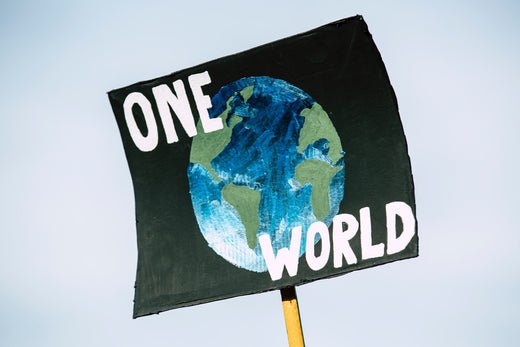
How to Join the Fight Against Climate Change
Climate change remains to be a topic of interest as the earth’s temperature increases. In light of this issue's global scale and complexity, it requires immediate action from individuals, industries, and governments alike. According to a survey conducted by the Pew Research Center, climate change continues to be a top threat across 19 countries.
Although this issue may not only have one solution, reducing carbon footprint and mitigating its effects is the responsibility we all should be taking part in. Unfortunately, climate change is not an issue that can be completely eliminated, but we can adopt new behaviors and take personal action to stabilize global temperatures. Here’s a few ways you can join the fight against climate change.
Reduce your Carbon Footprint
You can reduce your carbon footprint by limiting your energy consumption daily. This means you need to reduce activities that produce large amounts of carbon dioxide (CO2) through the burning of fossil fuels.
Some ways to do that are by taking public transportation, conserving energy at home, using less water, and shutting off and disconnecting electronics and lights in your home when they are not in use. To learn more read our blog 7 ways to reduce your carbon footprint.
Educate Yourself and Your Community
Reading about climate change and the effects it has on our environment is essential to understand what it is.
You can go to your local library, download books, or listen to podcasts to further your understanding of the topic so that you can share and educate others. Surprisingly, there are many people who are unaware or do not understand the long-term effects and crisis of climate change.
This is a great opportunity to share what you have learned with your family, friends, and community. You have the ability to change people’s behaviors and actions by simply promoting awareness.
Reduce Food Waste
Food waste is a big problem globally. According to the FDA, “Food is the single largest category of material placed in municipal landfills.” In most cases, these foods are leftovers from our plates or rotting foods in our refrigerators.
The good news is that you can reduce food waste by buying, storing, and preserving food smartly. You can freeze food like meats and dairy to help keep it fresh for a longer period of time. Take what you need from that week and store the rest.
Another useful tip is to put your fruits and vegetables in glass containers, you can place a paper towel at the bottom to collect the moisture, this helps them from spoiling. Lastly, it's best practice to place your food at eye level, you are more likely to grab something in front of you. These small changes can make a difference.
Support for Climate Change Policies
Voting for politicians and government officials who support and present climate change policies is another way to join the fight. You can write a letter to your local representatives and urge them to create policies that take action on promoting sustainability and reducing greenhouse gas emissions. Spread the word and be the advocate your local community needs to help the cause.
Switch to Green Energy
Switch to green energy or any source of renewable energy including solar, wind, and geothermal power.
You can also invest in clean technology by purchasing an electric vehicle, installing solar panels or wind turbines, or choosing to use electricity from renewable energy sources. Though clean technologies may be more costly than non-renewable energy, as they get more widespread, more financial resources and accessibility will be available. Read more about the cost of renewable energy versus fossil fuels.
Eco-Friendly Transportation
Using eco-friendly transportation like public transportation, biking, or walking instead of driving reduces the burning of fossil fuels. You can also carpool with other people or use an electric or hybrid vehicle that uses electric power supplies versus gasoline.
Consider limiting your travel by airplane, which emits greenhouse gasses due to its combustion of fossil fuels. If you decide to travel by air, fly with an airline that is committed to reducing carbon print and fighting for the cause of climate change.
Insulation
Insulating your home helps reduce energy consumption and improves air quality. Keeping moisture out of your home keeps it cool during warmer temperatures and warm during colder temperatures, which is the most cost-effective way to save money.
Drink from a Reusable Water Bottle

Drinking from a reusable water bottle is a better option than drinking from a plastic bottle for two main reasons:
- A study conducted in the journal Water Research by John Hopkins University researchers found that PFAS substances were found in 39 out of more than 100 bottled waters they tested. PFAS are harmful chemicals that can lead to health problems like liver damage, fertility issues, and even cancers. Unfortunately, bottled water may or may not contain harmful chemicals but to be certain use a reusable water bottle like stainless steel. These are safer and friendlier for the environment.
- With millions of bottled waters tossed in landfills, choose a reusable one you can refill at your convenience. You can purchase one at a local grocery store. It’s best to get a stainless steel to keep your water cool.
Also, reduce using single-use plastic. The problem with single-use plastic is that once you use it, it goes straight to the landfill or ends up in our waters. And the majority of the time, these products do have the option of being recycled.
Support with a Local Clean-Up
Support your local community by volunteering for a clean-up in the parks, rivers, and or beaches. It is unfortunate that tons of trash end up in our streams and ultimately in our oceans.
Look for groups in your community that do clean-ups on a monthly basis. It will help remove trash from your community and separate what can be recycled.
Plant a Tree
Climate change can be mitigated by trees because they absorb carbon dioxide. If you are able to, plant a tree in your backyard to support reforestation efforts in your community.
We’re firmly rooted in our purpose to "Always leave the earth better than you found it®”. Joining the fight against climate change is something we can all do together by changing our behaviors and educating others on the importance of keeping our planet safe, clean, and liveable.






